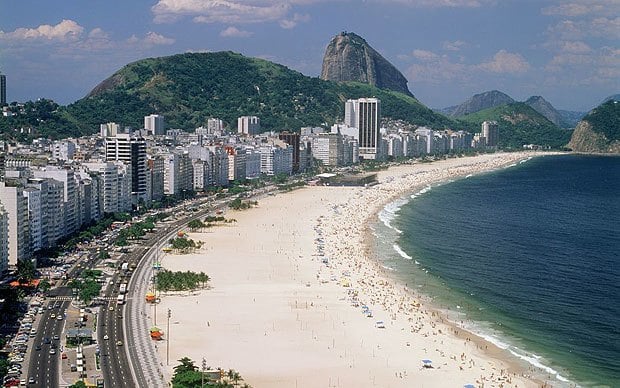Rio De Janeiro Under Fire Over 2016 Summer Olympics Water Pollution Issues
Posted on: August 2, 2015, 09:00h.
Last updated on: July 31, 2015, 03:38h.

Rio de Janeiro, to many, is a Brazilian paradise of lush beaches and dazzling Carnival parades, but an issue has now surfaced with the city’s upcoming Olympics that has many athletes concerned.
Betting on the 2016 Summer Olympics isn’t really available yet anywhere, but it seems as though swimmers and other athletes might be gambling on their health just by participating in the global competition.
According to the most recent data released by the Brazilian government, water pollution in Rio de Janeiro has reached such levels that some waters near the city are unfit for swimming.
That pollution reading came from the famous Copacabana Beach, and was based on samples that had been taken on Monday. But they were joined on Thursday by the results of an Associated Press investigation that had been ongoing for five months, one that also found dangerous levels of viruses and bacteria in the waters that will be used for some Olympic events.
High Levels of Adenovirus
The AP found that water from Copacabana Beach featured readings of over 2 million human adenovirus per liter, or about 2,000 times what would be considered a concerning amount at a beach in the United States or Europe. That announcement came just before Olympic qualifiers and a paratriathlon event were scheduled to take place in those waters this weekend.
Brazilian authorities blasted the AP report, noting that neither the EU, the US, or Brazil itself have limits on the viral counts in ocean waters.
But that doesn’t account for the earlier report from the state environmental agency. That warning was based on high levels of fecal coliforms in the water: single-cell organisms that normally live in the intestines of animals (including humans), and which can signal the presence of dangerous diseases like cholera and dysentery.
Water Quality Is Ongoing Issue for Rio
The problem may come from a high level of sewage that is present in those waters. The four rounds of AP tests and the warnings from Rio’s state authorities seemed to confirm what some athletes who had been training in the area already suspected.
“I’ve had high temperatures and problems with my stomach,” David Hussl, an Austrian sailor who has been training in Guanabara Bay, told The New York Times. “It’s always one day completely in bed and then usually not sailing for two or three days.”
Brazilian officials have said that improving the waterways of Rio de Janeiro is a major focus of Olympic preparations. The city has long had issues with water pollution, as waste runs throughout the city through open ditches that ultimately feed waterways, leaving the sewage to ultimately end up on beaches and in open water.
So far, the International Olympic Committee has said that testing for bacteria alone is enough for them, and IOC officials say that the World Health Organization has told them that there is “no significant risk” to athletes competing in Brazil. However, many experts who have looked at the results of the AP investigation dispute that assessment.
“What you have there is basically raw sewage,” marine biologist John Griffith said. “It’s all the water from the toilets and the showers and whatever people put down their sinks, all mixed up, and it’s going out into the beach waters.”
The 2016 Summer Olympics are scheduled to take place next August. Rio de Janeiro is scheduled to become the first South American city to host the Summer Olympics.
Last Comments ( 2 )
This is disgusting and disgraceful! I'm sure Russia could convert the Sochi compounds, in the year left and at least salvage a decent summer games, where every one won't get sick. Or better yet I guarantee that China could dust off the "Birds Nest" and other venues in a year and probably put on a better games then Rio could with 9 more years. And Rio should have to pay for all mandatory repairs and preparations!!! I said all along that they only really cared about the FIFA World Cup, and they invested way to much time and money that. And despite FIFA trying to put a good face on the Rio Cup, athletes where getting sick and transportation was a nightmare! That's from the players themselves! You would think that having just hosted such a major international event they would be closer to finishing at least the transportation issues, or the temporary stadiums being used and designed for simplicity, or most important and something that would have actually benefited( and been a major justification to the 1000's of super poor and displaced homeless Brazilians) the citizens of Rio, Brazil, South America and the World as a whole, the WATER TREATMENT FACILITIES THEY PROMISED would be in place well in advance to clean the sewer they call a bay, most haven't even been started!!! Why? You ask, simple it wasn't needed for FIFA!!!! Rio's commitment to cleaning the water from my understanding was a key component to the Olympic Committee awarding Rio the games.The Mayor of Rio, has now admitted that the water will not be ready and at safe levels for athletes, scientists just last week said the water was in fact like swimming in raw sewage! To me Rio has broken the faith, an Olympic city's first responsibility is the safety of the Athletes and officials. There has been and still is major security concerns with Rio, as one of the most violent cities in the world, from narco traffickers to guerrilla movements. But now the athletes who compete in water events are putting their health and possibly lives in serious jeopardy by entering the bay!!! That alone is enough to do an emergency location shift! But that unfortunately is just the tip of the deadly Ice burg that is "Rio 2016"....